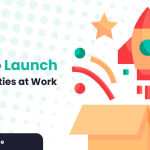
This week, we’re excited to introduce Dr. Alexandria White, Director of Diversity at Reboot Accel and consultant with more than 15 years of experience delivering training around Diversity, Equity and Inclusion (DEI). She consults with organizations on ways to create more diverse and inclusive workplaces. Her expansive professional career has involved retail banking, leadership, community activism, diversity planning and higher education. In addition, she is the founder of S.A.M.S. (Student Affairs MomS), the largest online community for mothers working in the student affairs profession.
The following is a conversation about DEI in the workplace, and her take on implementing intentional DEI strategy for the benefit of overall business and employee morale.
Beyond the dictionary definition, what does Diversity, Equity and Inclusion (DEI) mean to you?
DEI is a personal passion. In 2013, my passion was ignited when George Zimmerman was acquitted for killing Trayvon Martin. I have five brothers and Trayvon was the same age as one of my brothers when he was killed. I knew I had to use my passion, education and purpose to propel DEI and social justice efforts. Utilizing my educational background, research and informal focus groups, I began to formulate my DEI personal philosophy and agenda. My DEI personal philosophy is, as an inclusive disrupter, I will use my voice, network and passion to educate, challenge, motivate and love all people regardless of their views.
Finally, the ability to communicate and exchange with various people to understand their lived experiences is what DEI means to me.
Despite many leaders understanding how crucial it is to foster an inclusive work environment - for their people and their bottom line - many still find the issue of diversity difficult to talk about. What advice do you have for those who might be afraid to say the wrong thing, and in turn become slow to act on these important issues?
I understand that conversations around DEI can be uncomfortable for some people. I urge people to discuss these topics with a trusted person or experienced facilitator. As a DEI strategist, I facilitate numerous sessions on social justice and DEI, I want everyone in my training to feel included, respected and valued. It is imperative to listen to all opinions, even those that you disagree with. If you find yourself fearful to act on inclusivity, start doing the personal work of understanding your paralysis. Start reading articles and books from an array of authors. Listen to various podcasts, radio or television stations on topics of religion, politics and social justice. Also consider these questions: Do I feel I have something to contribute? What is my motivation for speaking up or advocating for an underrepresented group? How can I contribute to the conversation?
There is a lot of talk about what leaders can and should be doing to advance DEI principles in the workplace. How would you describe the role of employees in this process?
Employees are imperative to moving the needle on DEI in the workplace. The role of employees is to challenge current policies and procedures to be more inclusive. Employees can hold senior management accountable for implementing DEI principles in the workplace. For example, many companies have climate surveys to assess overall employee engagement. Employees should use this time to be candid about the improvements and/or achievement regarding DEI efforts.
What do you find to be the most difficult aspects of working with companies to implement these principles? And how do you overcome these pain points?
There is not a diversity finish line or a single problem solver to have a more equitable company. Some companies want to rush or implement a ‘checkbox’ DEI strategy to fulfill their goals. Unfortunately, this type of implementation usually hurts the company, its employees and stakeholders. I always advise against performative DEI measures for companies. In contrast, I urge companies to implement intentional DEI strategy for the benefit of overall business and employee morale. To overcome these pain points, I provide research and data to companies about the benefits of a DEI strategy. A DEI strategy that includes benchmarking and metrics and overall company input.
For decades, employees have taken matters into their own hands and formed groups, such as ERGs and Affinity Groups, to promote an inclusive work environment. You are the founder of a community yourself: S.A.M.S (Student Affairs MomS). What positive outcomes have you experienced as a result, and what type of impact can these groups have on DEI in the workplace overall?
I created S.A.M.S. (Student Affairs MomS) out of a personal need. Being the only mom and woman of color in my department, presented various scenarios that my colleagues were unfamiliar with. This community has grown to over 8,000 mothers who work on college campuses. This group provides critical, crowd-sourced support to our community. Recently, due to Covid-19 and its impact on higher education many S.A.M.S. were furloughed or laid off from their jobs. Collectively, S.A.M.S. raised over $10,000 to help mothers impacted by the pandemic. Providing financial resources is a component of Diversity, Equity and Inclusion (DEI). In addition to providing financial resources, the S.A.M.S. community has advocated for pay equity and flexible work arrangements at institutions of higher education.
We hope you enjoyed this conversation with Dr. Alexandria White. We encourage you to dive deeper and check out the work she’s doing at Reboot Accel. In the meantime, feel free to connect with us and discover how MixR can help you achieve your community-building goals and bring your D&I strategy to life through Trust & Belonging.







